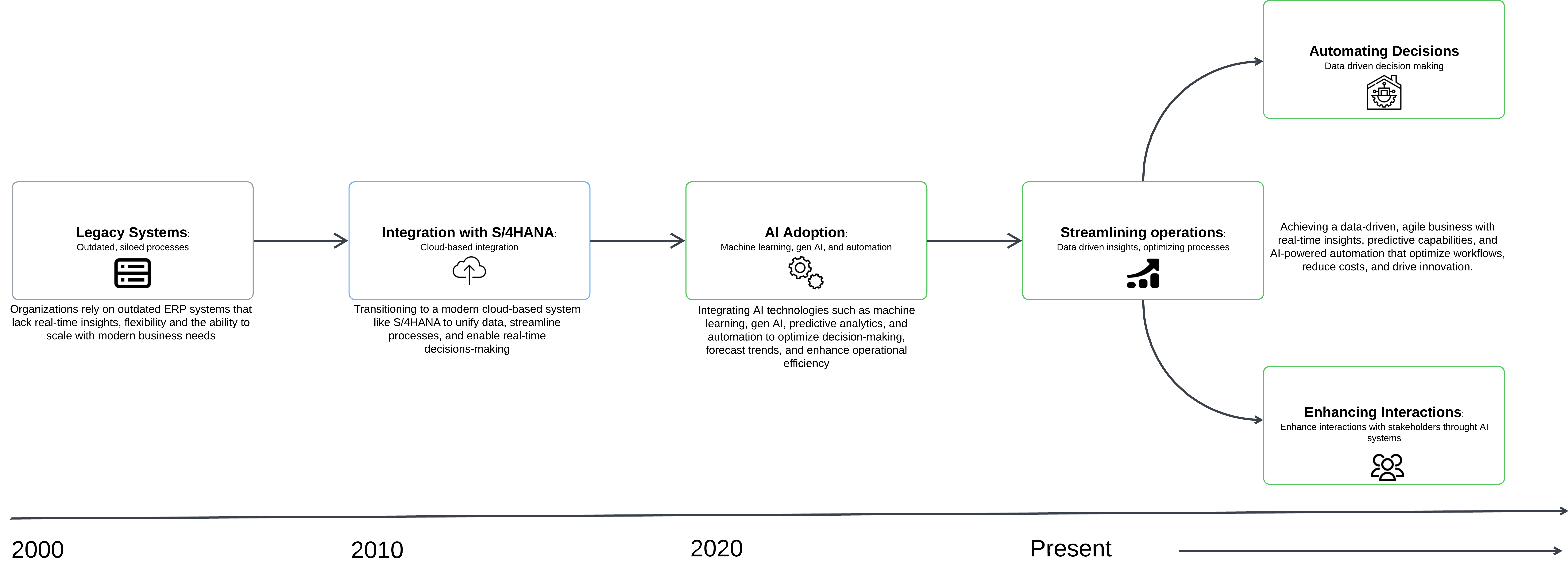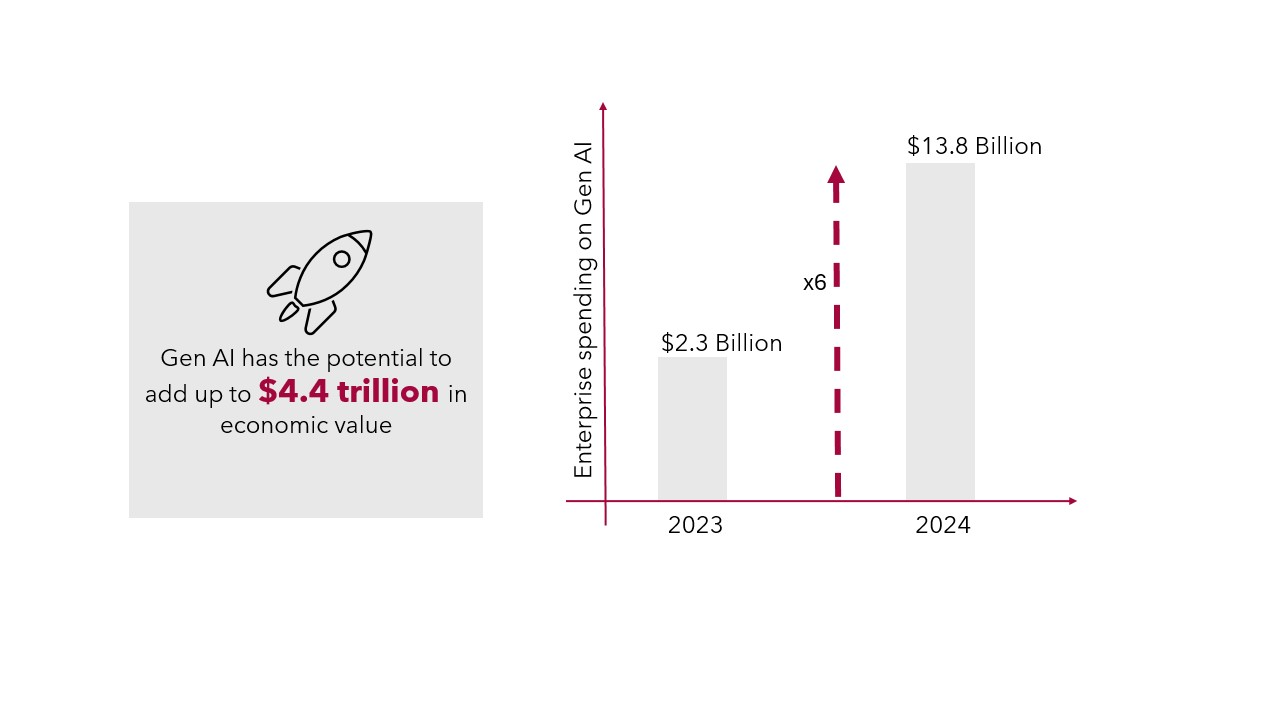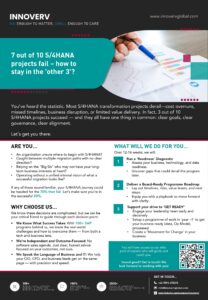
Colour Choice – Moving to S/4HANA from ECC – What’s your colour?
September 16, 2023How AI is Shaping the Digital Transformation Journey

AI Transformation | 10 January 2025 | 6 minute read
From Legacy to Innovation:
How AI is Shaping the Digital Transformation Journey
We’re excited to welcome you to our blog series on AI-driven Digital Transformation! As traditional industries embrace digital transformation, AI and AI agents are playing an increasingly important role in reshaping business operations. In the coming posts, we’ll explore how AI enables businesses to adapt, innovate, and grow by offering insights, practical tools and real-world examples.

Introduction
Traditional businesses are embarking on transformative digital journeys, transitioning from legacy ERP systems to next-gen cloud-first solutions like SAP S/4HANA. Industries such as manufacturing, pharmaceuticals and consumer goods are therefore facing unique challenges. While these migrations can streamline operations, eliminate data silos, and accelerate innovation, they also require strategic guidance and careful execution.
This shift is far more than a technological upgrade – it is a foundational step in digital transformation. Businesses often struggle with outdated technology, isolated data, and rigid processes that hold back innovation and efficiency. Consider a large consumer goods manufacturer transitioning from a complex, outdated ERP to S/4HANA in order to streamline its supply chain management and group financial reporting, or a logistics firm adopting S/4HANA and AI-driven analytics to enhance real-time tracking and optimise route planning. Such transformations involve intricate challenges that demand more than just technical know-how; they require strategic vision, data-driven insights, and innovative application of AI.
This push towards next-generation ERP solutions is happening as enterprise spending on generative AI is skyrocketing. In 2024, this investment reached $13.8 billion – over six times the $2.3 billion spent in 2023. This dramatic shift from experimentation to implementation includes $4.6 billion specifically allocated to practical AI applications, an eightfold increase from 2023. CEOs and their C-suites are no longer asking if they should invest in AI – they are asking how best to integrate AI capabilities to achieve measurable business impact whilst maintaining both responsible stewardship of technology and corporate reputation.
In this emerging era, INNOVERV stands as a trusted partner, offering expertise in SAP business transformations and advanced AI solutions. We empower organisations to evolve and thrive in today’s digital world, helping them to unlock new levels of efficiency, scalability, and insight. At INNOVERV, we believe in a people-centred approach and ensure that both our clients and our teams are at the heart of every solution. Beyond our proven SAP transition methodologies, we provide advanced AI frameworks that deliver tangible value.

The Role of AI in Industry
Unlike born digital tech-native organisations, traditional businesses may find themselves burdened by legacy systems and established processes that limit agility. This transition introduces a “digital gap,” where traditional companies are perhaps prevented from responding swiftly to market shifts and consumer demands. AI – and specifically Agentic AI – emerges as a powerful equalizer, allowing these businesses to close the gap and regain the competitive advantage.
A consumer goods manufacturer may struggle with real-time inventory management or dynamic pricing without the real-time insights that new-gen ERP systems such as S/4HANA can provide. Here, AI emerges as a powerful tool, enabling such businesses to close the gap, optimize operations and drive sustainable growth. By leveraging AI’s capabilities in predictive analytics, multi-agent systems, intelligent automation and data-driven decision-making, traditional businesses can become more agile and responsive to an increasingly competitive market.
AI’s versatility is evident across industries. For example:
- Finance: AI algorithms detect fraud, assess credit risks, and deliver personalised investment strategies.
- Manufacturing: AI powered solutions optimise production lines and predict maintenance.
- Logistics: AI enhances real-time tracking and optimises route planning.
Beyond these operational enhancements, AI supports strategic decision-making at the highest level. With AI-driven analytics at scale, leaders have a data-rich foundation for fast, informed decisions. However, the journey demands care and responsibility and organizations must embrace it thoughtfully. There is a need to balance innovation with ethical considerations, regulatory compliance, and risk management.
The Emergence of AI Agents
A key element of this revolution has come from the rise in adoption of AI agents, predicted to transform business operations and individual productivity. These are autonomous, goal-driven systems that combine AI models, user interfaces, and workflows to understand, think, act and learn in real world settings. Essentially, they function as digital employees or companions, automating routine tasks, helping and adapting continuously as they interact with users and data.
In 2025, AI agents will become increasingly common, reshaping the way we work and live. These digital workers can understand, plan and execute complex tasks, ultimately increasing efficiency and output. As Nvidia CEO Jensen Huang noted at the AI Summit in Japan, “AI will be able to do 50% of the work for 100% of people,” reducing costs and increasing productivity.
Navigating AI’s Risks and Opportunities
As organisations integrate AI into their operations, they encounter various applications, with both advantages and unique challenges. Understanding these broad archetypes helps executives choose the right AI solutions, agents, and risk mitigation strategies.
- Automating Decisions: AI systems often deployed as autonomous agents making data driven decisions, often in real-time, with minimal human intervention.
- Streamlining Operations: AI to optimise and automate routine processes, increasing operational efficiency, reducing costs, and speeding up workflows.
- Enhancing Interactions: Advanced AI agents enhance human interactions with customers, employees, or other stakeholders. AI tools in this category are often conversational (chatbots, virtual assistants) or personalized engines.
Such cases of course open doors, yet executives must remain vigilant. AI can also introduce risks, such as algorithmic bias, data privacy issues, or unintended compliance violations. Leaders must integrate AI strategies responsibly.
Staying Ahead of the Legal Landscape
As AI adoption accelerates, regulatory bodies worldwide are introducing laws and guidelines to govern its ethical use. One of the most influential frameworks is the EU AI Act, which provides a structured approach for managing AI risks. It is critical for organizations to stay informed of these legal frameworks and take proactive measures to ensure compliance.
Meeting legal standards is as much about maintaining trust with customers, partners, and other stakeholders as it is avoiding fines or penalties. As AI regulations continue to evolve, businesses must remain agile and ensure their AI systems adhere to the current legal standards.
What to Expect From This Blog Series
This blog marks the beginning of a comprehensive four-part series designed to guide organizations through AI’s transformative potential and its strategic applications. Each post will provide valuable insights and practical tools to help businesses unlock AI’s full potential responsibly.
- Blog 2: AI Archetypes and Applications – A dive into the various AI archetypes, their real-world applications, and the opportunities they provide across industries.
- Blog 3: Legal Considerations – An in-depth review of the evolving AI regulatory landscape, with a focus on the implications of the EU AI Act.
- Blog 4: Responsible AI Frameworks – Explore how companies are adopting responsible AI practices, addressing operational risks, ethical challenges, and compliance requirements through responsible AI (RAI) frameworks.
Conclusion
AI is reshaping industries and decision-making processes, but unlocking its full potential requires a balanced approach. By understanding AI archetypes, mitigating risks and staying informed about regulations, businesses can navigate AI adoption responsibly.
Are you ready to take your digital transformation to the next level? Contact INNOVERV to learn how we can guide your journey with SAP and AI solutions.
Thank you!
Don't miss our next blog, where we'll dive into AI use case archetypes and uncover how each one can revolutionize your business!




